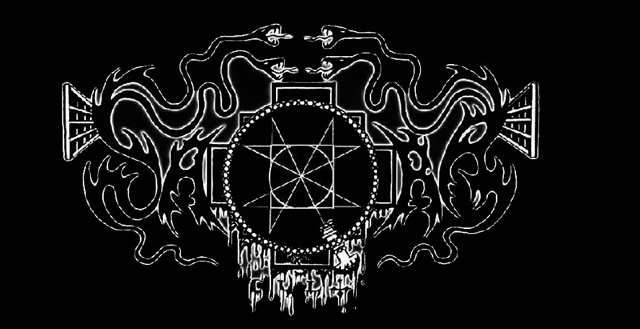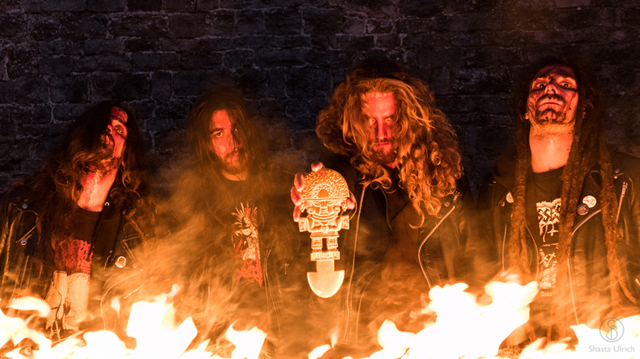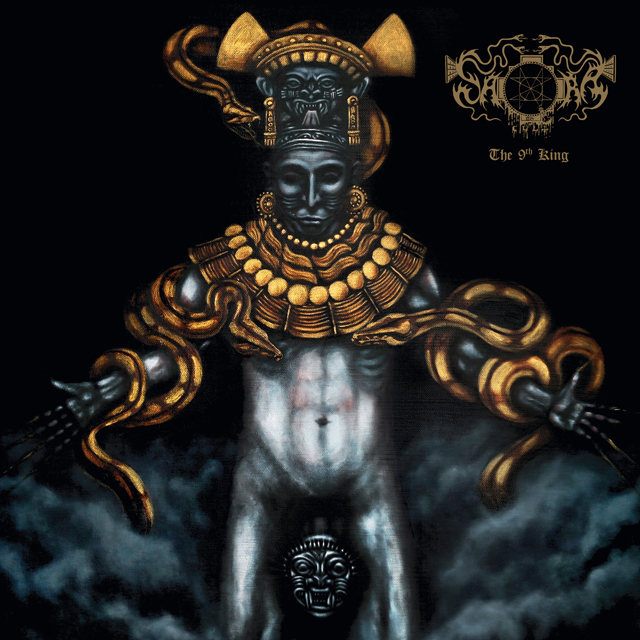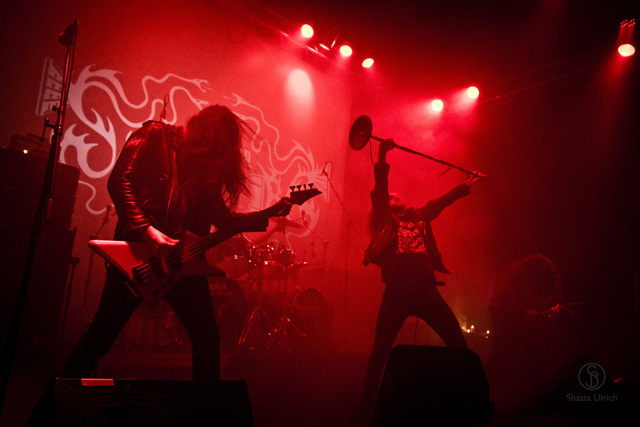
2019 certainly got off to a fiery start courtesy of The 9th King, second album from Belgian band Saqra’s Cult. Although fairly new on the scene with debut demo ‘Initiation To Forgotten Rites’ being unleashed in 2015 the quartet have certainly created an impression on their releases and in the live arena. Doing something slightly different musically and thematically the group have a historic interest in the Inca civilisation. We quizzed guitarist S. and singer A. about the band, naturally throwing a bit of history into the equation in the hope of unearthing some interesting facts about this illuminating cult.
AN: Greetings and congratulations on the new album, it certainly struck a chord with me. You are a relatively new band, can you tell us a bit about how Saqra’s Cult came about and what were your goals at the start?
S: Hello and thank you for your interest in our band. Saqra’s Cult started in 2014 when G and I, long time friend, had the idea of creating a twisted and vicious black metal band, based on acts such as Leviathan, Mayhem or Katharsis but with the heaviness of a band like Archgoat or Black Witchery, G being influenced by grindcore music as well, it appears to us as the musical child of our common inspirations. G wanted to do it around his cultural and inspirational roots, Inca culture, him being Ecuadorian. At first we rehearsed the two of us and we created one song (Inkarri, on the first album), maybe another (Uku Pacha). G was playing the drums, which was quite new for him and I was playing the guitar, which wasn’t. We were quickly joined by A. for the vocals and L. started to play the bass. We were all long time friends and we all played in Maleficence for instance, except G. We wrote our songs and recorded our first demo in our rehearsal place (many bands there…), but I had to play the bass if my memories are good. Later, we realised it would make more sense to put G on the bass, as he is a bassist, and L to the drummer, as he is a drummer. They both wanted to try something else, but realised that our musical aspiration needed more comfortable musicians. So after we switched, we started to write our first album and went to Blackout to record it. After that G. left the band because of his lack of time, but he is still part of the process as he is still the artist (always was, hopefully always will be) behind our artworks. He is now a tattoo artist and continues being an artist, we recommend you to check his work. J. then joined the band to form the entity that lives now, and just recorded its second LP.
After few shows in 2017 and 2018 in Europe (France, Germany, Iceland, Switzerland and Belgium), Saqra’s Cult went back in march 2018 at the studio to record what will be “The 9th King”.
Musically speaking, our goals are the same, maybe a bit more influenced by atmospheric productions such as Blood of Kingu, The Ruins of Beverast, in the vein of Death Fortress as well sometimes (although we discovered that later).
AN: There used to be four of you I believe, did you all know each other through the Belgian scene? Do you have a bass player at the moment as according to Metal Archives the last one has left the band?
A: We still are four in the band. There was a switch in the line up as explained before. We always had a bass player. We all knew each other for long time. A. (singer), S. (guitarist) and L. (drummer) were playing together in Maleficence before starting Saqra’s Cult. The underground scene in Belgium isn’t that big.
J: Well, Metal Archives was wrong. They asked me to join the band few months after the recording of “Forgotten rites”.

AN: Obviously you are doing something a bit outside the box as a black metal band and that is in essence channelling the spirit of the ancient Inca civilisation through your music. Is this a shared interest and what is it that drew you particularly to this part of history?
S: First of all we don’t claim to be experts of the subject. We, for the main part of the band, aren’t directly linked to that history and we don’t want to speak in the name of others. We found interest in the history of this civilisation on a common shared curiosity about rituals, other civilisations, and an agonistic vision of the Christian world that was expended there. To oppose Christian values, established as normal for people who don’t question it, Black Metal usually used Satanism as a direct antagonist. As much as this vision is also deeply ingrained in our belief system, we wanted to grasp other angles to deconstruct those dogmas. Since Gabriel Tapia (former drummer/bass player) is a friend and artist from Ecuador that was thought from this angle, we decided to continue in this direction to question dominant values that define what is the “modern world” today, which we don’t want to/can’t fit in. Christian values have been predominant in our world and our belief system, Inca culture was another fight against it (and still is in some parts). To summarize it, where there is an opposition between good (Christian) and evil (Satanism), we can find an all new perspective of both these spectrums, while searching in different cosmogonies. In the way it’s an opposition between Christianity and what was described as paganism, it is not so different from what the Norwegian first wave did with the pagan beliefs they were fighting for.
So even if G. left, we chose to continue that path. More over, it’s important to me to put the Christian views and values in balance from another perspective that what is common in Black metal. Not because I think it’s necessary, but because it’s an exercise I like to do. Critical visions of G on the world are fuelled by his rejection on the Christian invaders that spread their values in the world, that’s also our point.
AN: Obviously on hearing the savagery in your music for the first time I had all sorts of images of human sacrifices and the bloodthirsty rites of the Incas. Of course they were an incredibly civilised race responsible for plenty in the way of transport networks, communication and architecture for example. Could you perhaps give us a few facts about the Incas our readers might not be aware of?
S: We’ve also used pre-Inca culture, but it’s not about some special historical achievements, it’s about the Incas putting in question Christian missionaries because they believe in something they were told, not something they had seen. Founding their system of belief on the world they were living in and not only on external explanations. We don’t claim to be expert in that domain though, we like to tell their stories that are filled with those system of values.
AN: I was interested in how you tied things into the narrative themes within the music and your whole ethos. From what I have read Saqra means “roguery, restlessness, agility or mischief in English.” Was there actually a cult who practised these things and what do you know about them?
S : There still is, but it was related to post-colonial dances, meaning Christian influenced. It’s a dance, and trust me, as a lot of things in the Inca culture, it does not look evil as you expect from an “evil cult”. The saqra dances aren’t really what we were focused about though.
A : The name Saqra’s Cult was chosen to refer to a mean, restless entity. It’s a close synonym to Supay, which is the devil in Inca culture (God of Death, ruler of Uku Pacha in Quechua and it was the name Christians used to refer to their Devil).
S: Inca didn’t reject the Devil (Supay), as they were afraid of him and called, invoked him to ask him not to harm them. It was part of their world.

AN: As the album only contains 4 songs albeit very hefty ones can you give us an insight to the titles and themes in relation to their place in the history of the Incas. I take it this was something you researched quite in depth?
A: The four songs of the album refer to Pachacuti Yupanqui, the 9th king. At first it was just a song, the first of the new record. But after reading more about him we’ve decided that making a complete work referring to this powerful figure would make more sense. There are so many legends and stories around Pachacuti Yupanqui. Although he initiated the expansion of the Inca Empire, we focused more on the legends surrounding him. Often based on established facts, it is the mystical way they are told that has fascinated us. We found a fertile soil to build a coherent musical and lyrical universe.
We don’t want to teach the Inca culture in our lyrics, we want to transmit the emotions of precise history, real or mythical. The madness way of singing is always correlated to a precise and often violent passage of the story that we want to narrate. This brings a special aura, reinforcing in our opinion, the violence or the sadness of the lyrics. To be honest, it is really difficult to use original traditional Inca melodies into black metal as they are always cheerful.
AN: I missed out on the first album Forgotten Rites (2017) and plan to rectify that as soon as possible. How would you consider that you have grown as a band and developed musically since you started?
S: I think it’s the same direction, maybe a bit more heavy and original in some parts, but it’s the same spirit.
A: By listening to the demo “Initiation to Forgotten Rites”, then to the first LP you will be able to understand the evolution we did in the way of writing and living the music. Working with the same members during years gives us the opportunity to know how each other good and how everyone feels the composition and the way of working.
AN: A problem for many bands who adopt a theme is that they become stuck with it. Luckily you are no mediocre “pirate metal” band haha. Do you think the ideas and historical themes of what you do are something you can develop over time? I guess with a timeline spanning over a hundred years, civil wars, Spanish conquests etc there is plenty of scope to continue down this path or do you think the group has a natural lifespan that may conclude over a certain amount of albums?
S: We don’t plan anything, but I think this topic could be extended indeed, especially if you dig in pre Incas and similar cosmogony.
A: We don’t think that Saqra’s cult has a “natural lifespawn”. More than a band or a work, it’s a passion. We will stop it when we feel that the fire has gone out. About the lyrical themes it’s true that we’ll have plenty subject to think of so a boulevard of possibilities is open to us.
AN: You have active involvement in other acts such as Possession who you are a member of. Are all the bands as important as each other and do you have any difficulties with scheduling conflicts etc?
S: Different bands, same family, same passion. Never had a schedule conflict.
AN: Possession are playing London in a few days, what are the chances of Saqra’s Cult playing here. I know things could be a mess with Brexit which has put a lot of plans in turmoil due to uncertainty in the future? Have promoters here shown much interest and are you open to offers?
A: Saqra’s Cult is totally open to offers from promoters in England or everywhere else. We never played there so … No one knows how it will be after the Brexit. Only time will tell but I think it will always be possible to play in England.
S: London is always (and was again) a pleasure to play in. I’m sure we’ll be there.

AN: For those of us who have never had the opportunity to see the band how do you replicate the authentic sound and atmospheres we hear on album to the live setting?
S: We work with N, also helping Possession, he uses incense, candles and put an altar with Inca related objects, a Tumi for instance. But mostly, by playing it.
We try to make the live performances as accurate as the recordings. But personally I can truly express my twisted way of singing and it’s always an exhausting but completely possessing moment.
AN: I have always been partial to Belgium and its black metal artists from early output from the likes of Enthroned, Iconoclasm and Lugubrum right through to more recent groups such as Wiegedood, Saille and Alkerdeel. What are your thoughts on what is going on there at the moment. Do you have connections with other artists or would you consider things split up and everyone doing their own thing in a more insular way?
S: Plenty, we rehearse in the same place as Possession, Dikasterion, we’re close to Heinous as well, Pox, Slaughter Messiah, Moyen, Enthroned, Sabathan, Wolvennest, Dehuman, Bones, Goat Torment, Ars Veneficium, LVTHN, Evil Invaders, Emptiness and plenty other good entities. The scene is getting really good. The non playing scene as well with bands such as Perverted Ceremony / Moenen of Xezbeth
AN: Final question and a bit of a silly one but have you actually visited Peru and followed the trails of the ancient Incas? I guess you would love to play some shows there and get some photo opportunities for some promo shots on Machu Picchu given the opportunity?
S: I went once, as I have relatives living there. We would love to play there, the scene seems to be so crazy. But I would be uncomfortable to make Peruvian people pay to see Belgian dudes playing music about their culture. And fuck that Machu Picchu picture idea, just waiting for a deal with Inca Kola.
AN: Thanks for the interview and the great album, any parting words for our readers?
Our pleasure, cheers.
Interview Pete Woods

Leave a Reply